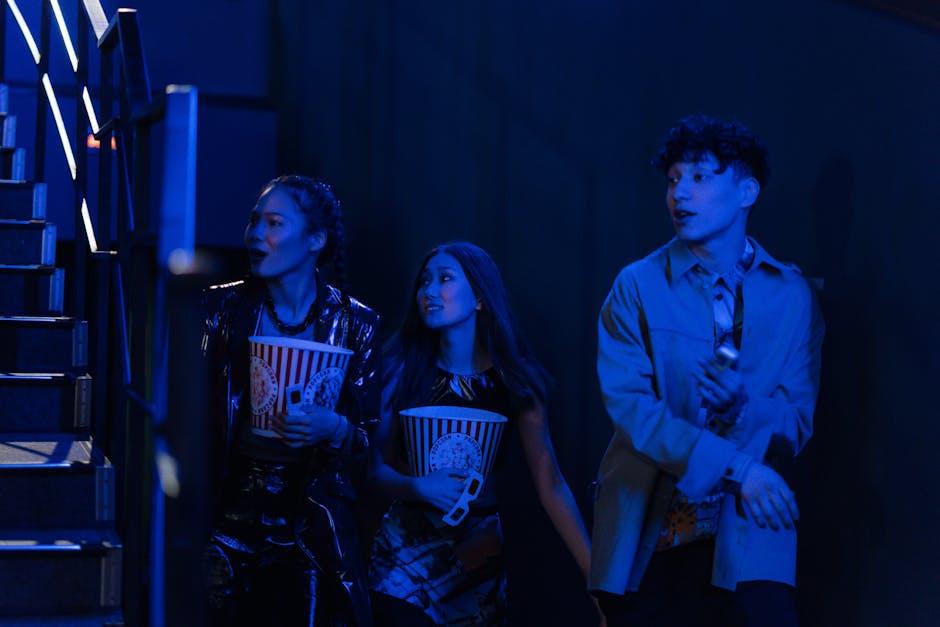In the vast tapestry of cinematic history, certain films stand out not merely for their artistic merit or box office success, but for their profound impact on audiences and culture alike. These life-changing movies transcend entertainment, offering viewers a lens through which to explore complex themes, challenge societal norms, and ignite personal introspection. As we delve into an era where digital streaming platforms have democratized access to an expansive array of films, the question of which movies hold the power to truly transform perspectives becomes increasingly pertinent. This article seeks to identify and analyze a selection of such films, each chosen for its unique ability to resonate on a deeply personal level while also contributing to broader cultural conversations. Through examining these cinematic masterpieces, we aim to uncover the elements that make them essential viewing experiences, urging audiences to engage with narratives that have the potential to alter the way we perceive the world and our place within it.
Cinematic Masterpieces That Reshape Perspectives
Some films transcend mere entertainment, becoming powerful vehicles for introspection and change. These cinematic gems not only captivate with their storytelling but also challenge our perceptions, inviting us to view the world through a different lens. They explore themes of identity, resilience, and the human condition with unparalleled depth. By examining these narratives, viewers are often compelled to reconsider their own beliefs and assumptions, making these movies an essential part of a transformative viewing experience.
- Thought-Provoking Narratives: Films that delve into complex philosophical questions, pushing the audience to contemplate moral dilemmas and ethical quandaries.
- Emotional Journeys: Stories that evoke deep emotional responses, encouraging empathy and a deeper understanding of diverse human experiences.
- Visual and Auditory Innovations: Movies that break traditional boundaries with groundbreaking cinematography and sound design, reshaping how stories are perceived and felt.
Exploring Emotional Depths Through Storytelling
At the heart of cinema lies its unparalleled ability to delve into the vast emotional landscapes of the human experience. Through the art of storytelling, films become mirrors reflecting our deepest fears, desires, and aspirations. They offer a unique avenue to explore the complexities of the human condition, providing audiences with a visceral connection to characters and narratives. Some films transcend mere entertainment, becoming profound experiences that resonate on an emotional level. These movies challenge us to confront our own emotions, sparking introspection and growth.
- Empathy and Understanding: Films that explore emotional depths often cultivate empathy, encouraging viewers to step into the shoes of diverse characters and understand their perspectives.
- Personal Reflection: They inspire audiences to reflect on their own lives, prompting questions about identity, purpose, and the nature of happiness.
- Transformative Power: By witnessing the journeys of characters, viewers may find inspiration to embark on their own paths of change and self-discovery.
Through these elements, storytelling in cinema becomes a powerful tool for emotional exploration, inviting us to navigate the intricate tapestry of human emotions with open hearts and minds.

Cultural Reflections and Societal Impact in Film
Films have long been a mirror reflecting the complexities of our societies, offering insights into cultural norms and societal transformations. Through the lens of cinema, we witness a powerful dialogue between the individual and the collective. Movies like “Schindler’s List” and “12 Years a Slave” are not just narratives of historical events but profound commentaries on human rights and the enduring fight against oppression. These films challenge viewers to confront uncomfortable truths, sparking conversations about justice and moral responsibility. By portraying the past with raw authenticity, they serve as a catalyst for change, urging societies to learn from history and strive for a more equitable future.
- Representation and Diversity: Films such as “Moonlight” and “Parasite” highlight the importance of diverse narratives, providing a voice to underrepresented communities and offering audiences a chance to experience life from different perspectives.
- Technological Influence: Movies like “The Matrix” and “Her” delve into the implications of technology on human existence, prompting reflections on identity, reality, and the essence of human connection in an increasingly digital world.
As we explore these cinematic masterpieces, it becomes evident that films are more than entertainment; they are profound cultural artifacts that shape and are shaped by societal dynamics. By engaging with these narratives, audiences are encouraged to reflect on their own beliefs and the societal structures around them.

Timeless Narratives with Universal Messages
Throughout the history of cinema, certain films have transcended their era, offering insights and reflections on the human condition that remain relevant across generations. These movies often explore themes of love, sacrifice, courage, and redemption, serving as mirrors to our collective experiences. Such narratives possess the power to resonate deeply, encouraging introspection and dialogue among viewers. Here are some films that exemplify these timeless qualities:
- “The Shawshank Redemption”: A tale of hope and perseverance in the face of adversity, reminding us of the enduring human spirit.
- “Forrest Gump”: An exploration of destiny and innocence, showcasing how life’s unpredictability shapes our journey.
- “Schindler’s List”: A profound narrative on the impact of individual actions amidst the horrors of history, emphasizing moral courage.
- “Eternal Sunshine of the Spotless Mind”: Delving into the complexity of memory and relationships, this film questions the essence of love and loss.
These stories, while set in diverse contexts, share universal messages that continue to inspire and provoke thought. By engaging with these films, audiences are not only entertained but also offered a lens through which to view their own lives and the world around them.
To Wrap It Up
the films discussed in this article each offer a unique lens through which to explore the complexities of human experience. From narratives that challenge societal norms to those that delve into the intricacies of personal growth, these movies have the power to resonate on a deeply personal level while also fostering a broader understanding of the world. By engaging with these cinematic masterpieces, viewers are not only entertained but are also prompted to reflect on their own lives and the diverse realities of others. In an era where visual storytelling continues to evolve, these life-changing movies remain timeless, serving as both cultural touchstones and catalysts for introspection. As such, they deserve a place on the must-watch list of anyone seeking to expand their perspective and enrich their appreciation of the art of filmmaking.







































